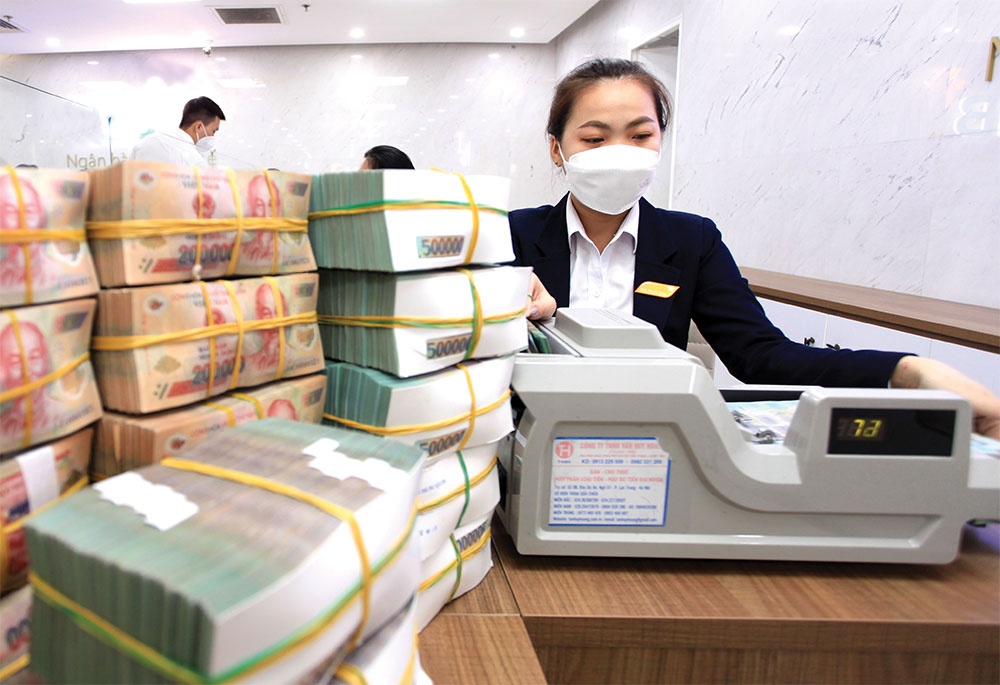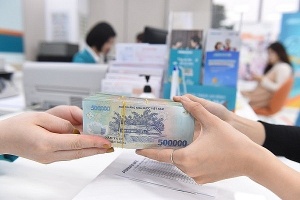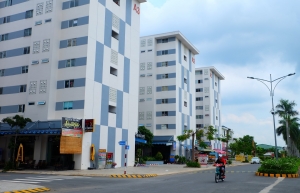Credit bubble risk reality as banks hit lending capacities
 |
| A glut of cheap capital has the potential to damage the economy, photo Le Toan |
According to one bank’s general director, despite offering a loan programme with a low annual interest rate of 5 per cent and a significant limit of almost $170 million, customers are hesitant to borrow. The bank has been closely monitoring the credit situation, which has been the primary focus in recent months. This is an unprecedented occurrence.
“The credit situation is almost all we cared about lately. At the end of the loan term, enterprises only come to pay off the debt without further borrowing. On the other hand, there are businesses looking for ways to get loans, but we do not dare to lend because we clearly see the risks. The board is vigilant about ensuring financial safety,” said the general director.
This situation is not unique, as even major banks like Vietcombank have experienced minimal credit growth, barely reaching 0.5 per cent by the end of June.
A senior official from the State Bank of Vietnam (SBV) acknowledged the challenging economic conditions. Credit growth has decreased or even turned negative in some banks, as businesses, including reputable ones, have become cautious. However, certain banks have almost fully utilised their credit capacity by using technical measures to promote corporate lending within their ecosystem.
“These banks have not adhered to the rules and have adjusted their provisions for these loans, which is against regulations,” the official said.
The SBV’s data revealed that credit institutions have implemented repayment term structures for 2,800 customers, and this process is still ongoing.
As of June 27, credit has increased by 4.03 per cent compared to the same period last year, showing a growth rate of 9.08 per cent. Credit to the real estate business increased by 14 per cent in the first five months of the year, indicating that previous measures to address market challenges have started to yield results. However, credit for real estate consumption has decreased by 1.32 per cent during the same period, contrasting with a 15 per cent increase last year.
SBV Governor Nguyen Thi Hong highlighted that individual real estate investors and consumers are still hesitant to invest, resulting in low credit demand.
“Addressing legal obstacles and adjusting house and real estate prices are among the solutions to stimulate consumption and investment in the real estate sector,” Hong said.
She added that after reducing the operating interest rate consistently in the past, interest rates have now returned to pre-pandemic levels. The SBV is one of the few central banks in the world that has lowered interest rates while other countries have raised rates. By June 15, there were over 100 interest rate hikes globally.
“The SBV is currently instructing credit institutions to review procedures and documents to facilitate credit access. Additionally, it is considering and will soon announce the credit growth direction in the near future, following the prime minister’s guidance,” the governor noted.
Dinh Duc Quang, country head of Global Markets at UOB Vietnam, assessed that the SBV has taken more aggressive actions than expected, cutting refinancing rates by 150 basis points to 4.5 per cent in June. This indicates a looser policy stance by the SBV, with the possibility of further interest rate reductions in the third quarter of 2023.
Factors such as weak export activity, the Fed’s decision to halt rate hikes, the potential for rate cuts in 2024, and confidence in the stability of the VND exchange rate contribute to the prospect of additional rate cuts in Vietnam.
“We projected that interest rates could decrease by another 100 basis points in the third quarter, after which the SBV will pause to assess the impacts,” Quang said.
Nguyen Thi Phuong Thanh, an expert at VNDirect’s analysis division, highlighted that commercial banks have also implemented significant policy changes, reducing lending interest rates by 0.5-1 percentage points for existing and new loans, and even more for loans related to consumption, working capital, and business activities.
“However, there are potential risks associated with a sharp decline in lending interest rates, as it could lead to the use of cheap capital for subprime projects and create a credit bubble risk for the economy,” she emphasised.
A director from a joint-stock commercial bank’s small- and medium-sized enterprise division commented, “While the SBV requires credit institutions to maintain lending standards, some banks have faced pressure and lowered their standards against their better judgment. This has resulted in increased credit growth, but may be short-lived due to the potential emergence of bad debt.”
 | Vietnamese businesses await relief as SBV slashes interest rates Vietnamese businesses anticipate some relief as the central bank slashes interest rates amidst the economic challenges, with credit growth expected to accelerate in the second half of 2023. |
 | Stimulation essential to boost demand, yet credit vigilance required Pham The Anh, a senior expert from the National Economics University, scrutinises the government's measures to stimulate economic growth, while discussing the threats to development in the face of low demand. |
 | Credit disbursement delays affect social housing plans The Ministry of Construction (MoC) has sent a report to the prime minister on the disbursement of a VND12 trillion ($508 million) credit package for a social housing development initiative. It has also assigned the Department of Construction to make lists of projects in various localities to submit to the relevant local people's committees for public announcement. |
What the stars mean:
★ Poor ★ ★ Promising ★★★ Good ★★★★ Very good ★★★★★ Exceptional
Related Contents
Latest News
More News
- Raised ties reaffirm strategic trust (February 20, 2026 | 14:06)
- Sustained growth can translate into income gains (February 19, 2026 | 18:55)
- The vision to maintain a stable monetary policy (February 19, 2026 | 08:50)
- Banking sector faces data governance hurdles in AI transition (February 19, 2026 | 08:00)
- AI leading to shift in banking roles (February 18, 2026 | 19:54)
- Digital banking enters season of transformation (February 16, 2026 | 09:00)
- IFC to grant $150 million loan package for VPBank (February 13, 2026 | 09:00)
- Nam A Bank forms position as strategic member at VIFC through three key partnerships (February 12, 2026 | 16:39)
- Banks bolster risk buffers to safeguard asset quality amid credit expansion (February 12, 2026 | 11:00)
- VNPAY and NAPAS deepen cooperation on digital payments (February 11, 2026 | 18:21)

 Tag:
Tag:




















 Mobile Version
Mobile Version